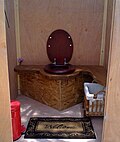Composting toilet
Composting toilets are a type of toilet that treat human excreta by a biological process called composting. This process leads to the decomposition of organic matter and turns human waste into compost-like material but does not destroy all pathogens. Composting is carried out by microorganisms (mainly bacteria and fungi) under controlled aerobic (oxygenated) conditions. These toilets are designed to decompose waste on-site, eliminating the need for a traditional sewage system or septic tank.
Overview[edit]
Composting toilets can vary in complexity from simple collection systems to advanced, ventilated units. They are part of a broader category of systems known as ecosan (ecological sanitation), which also includes urine-diverting dry toilets (UDDTs). The primary aim of composting toilets is to reduce the use of water for flushing and to prevent pollution of water bodies. They are an environmentally friendly alternative to conventional flush toilets, especially in areas without access to water and sewage treatment facilities.
Design and Operation[edit]
The design of composting toilets allows for the aerobic decomposition of human waste, turning it into compost through the action of microorganisms. A well-designed composting toilet maintains the proper carbon-to-nitrogen ratio, moisture content, and temperature to facilitate aerobic decomposition and minimize odor.
- Types of Composting Toilets###
1. **Self-contained units**: These are installed directly in the bathroom and contain the composting chamber within the unit. 2. **Centralized systems**: In these systems, the composting takes place in a central location outside the house, and toilets are connected to the composting chamber by a chute.
- Key Components###
- **Ventilation system**: Ensures aerobic conditions and helps in odor control. - **Leachate collection system**: Collects any liquid runoff to prevent water pollution. - **Access door**: For removing finished compost.
Benefits[edit]
- **Water conservation**: Significantly reduces the use of water for flushing. - **Nutrient recycling**: Converts human waste into a nutrient-rich compost that can be used to improve soil fertility. - **Environmental protection**: Reduces pollution of water bodies and decreases the reliance on sewage treatment plants.
Considerations[edit]
- **Maintenance**: Requires regular maintenance to ensure proper composting and to remove the finished compost. - **Cultural acceptance**: May face resistance due to cultural preferences for water-based toilets. - **Regulatory approval**: In some regions, the use of composting toilets is subject to specific regulations and standards.
Health and Safety[edit]
Properly managed composting toilets pose a low health risk. However, it is crucial to ensure that the composting process has adequately reduced the levels of pathogens before using the compost. Personal protective equipment (PPE) should be worn when handling compost.
Applications[edit]
Composting toilets are suitable for a wide range of applications, including remote areas, national parks, ecotourism sites, and residential homes seeking sustainable sanitation solutions.
-
Composting toilet
-
Composting toilet
-
Composting toilet
-
Composting toilet
-
Composting toilet
-
Composting toilet
-
Composting toilet
-
Composting toilet
-
Composting toilet
-
Composting toilet
Ad. Transform your life with W8MD's Budget GLP-1 injections from $75


W8MD offers a medical weight loss program to lose weight in Philadelphia. Our physician-supervised medical weight loss provides:
- Weight loss injections in NYC (generic and brand names):
- Zepbound / Mounjaro, Wegovy / Ozempic, Saxenda
- Most insurances accepted or discounted self-pay rates. We will obtain insurance prior authorizations if needed.
- Generic GLP1 weight loss injections from $75 for the starting dose.
- Also offer prescription weight loss medications including Phentermine, Qsymia, Diethylpropion, Contrave etc.
NYC weight loss doctor appointmentsNYC weight loss doctor appointments
Start your NYC weight loss journey today at our NYC medical weight loss and Philadelphia medical weight loss clinics.
- Call 718-946-5500 to lose weight in NYC or for medical weight loss in Philadelphia 215-676-2334.
- Tags:NYC medical weight loss, Philadelphia lose weight Zepbound NYC, Budget GLP1 weight loss injections, Wegovy Philadelphia, Wegovy NYC, Philadelphia medical weight loss, Brookly weight loss and Wegovy NYC
|
WikiMD's Wellness Encyclopedia |
| Let Food Be Thy Medicine Medicine Thy Food - Hippocrates |
Medical Disclaimer: WikiMD is not a substitute for professional medical advice. The information on WikiMD is provided as an information resource only, may be incorrect, outdated or misleading, and is not to be used or relied on for any diagnostic or treatment purposes. Please consult your health care provider before making any healthcare decisions or for guidance about a specific medical condition. WikiMD expressly disclaims responsibility, and shall have no liability, for any damages, loss, injury, or liability whatsoever suffered as a result of your reliance on the information contained in this site. By visiting this site you agree to the foregoing terms and conditions, which may from time to time be changed or supplemented by WikiMD. If you do not agree to the foregoing terms and conditions, you should not enter or use this site. See full disclaimer.
Credits:Most images are courtesy of Wikimedia commons, and templates, categories Wikipedia, licensed under CC BY SA or similar.
Translate this page: - East Asian
中文,
日本,
한국어,
South Asian
हिन्दी,
தமிழ்,
తెలుగు,
Urdu,
ಕನ್ನಡ,
Southeast Asian
Indonesian,
Vietnamese,
Thai,
မြန်မာဘာသာ,
বাংলা
European
español,
Deutsch,
français,
Greek,
português do Brasil,
polski,
română,
русский,
Nederlands,
norsk,
svenska,
suomi,
Italian
Middle Eastern & African
عربى,
Turkish,
Persian,
Hebrew,
Afrikaans,
isiZulu,
Kiswahili,
Other
Bulgarian,
Hungarian,
Czech,
Swedish,
മലയാളം,
मराठी,
ਪੰਜਾਬੀ,
ગુજરાતી,
Portuguese,
Ukrainian










